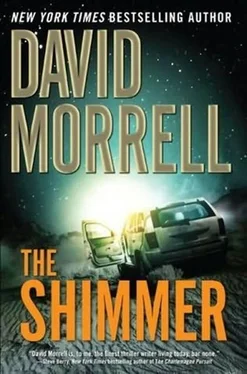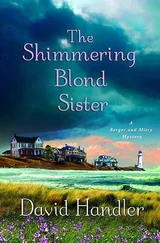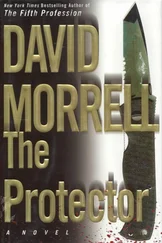Medrano looked at Page as if asking whether he wanted to know anything else.
Saddened by what he’d just heard, Page shook his head.
“Well, thank you for the help, Mr. Mullen,” Medrano said. “We’re sorry if we disturbed you. I’ll speak to the medical examiner about releasing your brother’s remains.”
“Anything to try to put this behind me. But I don’t understand how what I just told you is going to help. We know my brother shot all those people. It’s not as if there’s a big mystery about who did it.”
“The thing is, we’d also like to know why he did it.”
“There’s no mystery about that, either.”
“What do you mean?”
“Grief made him crazy.”
“I suppose you’re right,” Costigan said. “Thanks again for your help.” He shut off the speakerphone.
No one spoke for several moments. The only sounds came from outside the room-footsteps, hushed voices, a cart being pushed.
“So what did that tell you?” Medrano finally asked Page.
Tori turned to him, seeming to wonder the same thing.
“‘Don’t you see how evil they are?’” Page asked.
All three of them frowned in surprise, seeming to fear he’d become unbalanced.
“That’s the first thing Mullen shouted Thursday night.”
When they understood what he meant, they looked relieved.
“Then he yelled to the crowd, ‘Don’t you realize what they’re doing to you? Don’t you understand you’re all going to hell?’ When he shot at the lights, he screamed, ‘Go back to hell where you came from.’ Just be- fore he started shooting at the crowd, he shouted, ‘You’re all damned.’”
“The ravings of a man who’d recently become a religious fanatic,” Costigan said.
“But the lights weren’t the reason Mullen became a religious fanatic,” Page countered. “You heard what his brother said. Mullen suddenly needed to believe in God and heaven so he could convince himself that his wife was in a better place and that one day he’d join her there. But the lights are another matter. What they did to him made him furious.”
Tori looked as puzzled as Costigan and Medrano.
“They tempted him,” Page explained. “They were so alluring that for the first time since his wife died, he felt good. Better than good. They filled him with pleasure. That’s why he kept coming back- because the lights were like a drug. He fought what they did to him. He bought more religious statues and paintings. He tried to live like a monk and punish himself to prove that he loved his wife, that he was worthy to join her… but he couldn’t stop thinking about the lights. They were a pleasure he couldn’t stop craving. They made him furious because they showed him how weak he was. We’ll never know if he truly thought he could destroy the lights by shooting at them. Maybe he just needed a target for his rage.”
“And then he chose closer targets,” Medrano said, beginning to understand. “Targets he could hit.”
Page nodded. “Exactly. He decided that the lights were evil and that anybody who enjoyed them had to be evil, also.”
“Well, you’ve sure been getting your money’s worth from those psychology courses,” Costigan said.
Page felt his cheeks turn red with embarrassment. “I admit it’s only a theory.”
“One that can’t be proved.”
“Here’s another theory,” Page told them.
They waited. Tori looked at him as if she were seeing him for the first time.
“Assuming the lights are real…”
“A big assumption,” Medrano said. “I told you, I’ve never seen them, and it isn’t for lack of trying.”
“That’s not surprising.”
“How so?”
“If I’m right,” Page said, “the lights intensify the personalities of the people who try to see them. As a police officer, you’re a professional skeptic. That skepticism becomes emphasized out there. You’re too guarded to be able to see them.”
Page turned toward Costigan. “The man who killed your father was a drunk and a bully. You told me that after he came here, he got more extreme. One theory was that he felt humiliated by losing his job in Fort Worth and having to come to a small town where a relative man- aged to find work for him. His humiliation fueled his rage. But I don’t believe that. The more I’m in Rostov, the more I talk to people and overhear what they say, the more I think the lights mirror what’s going on inside us. They make whatever we are more extreme. Harriett Ward says James Deacon was obsessed with the lights when Birthright was filmed here. They reflected his need to be a great actor to the point that when he was supposed to age in the story, he actually did look older.”
“But as you say, that assumes the lights are real,” Medrano pointed out.
“If they’re not real, the idea still works. Under the right circum- stances, people who need to see the lights will believe they see them. They’ll project their personalities onto what they’re imagining. The result will be the same.”
“The man who killed my father never saw them,” Costigan said.
“And that made him furious,” Page replied. “When Tori and I were here earlier, you wondered if people could be affected by the lights even though they didn’t see them. Maybe it’s not the lights. Maybe it’s being out there in the dark, surrounded by nothing. People become more extreme versions of who they are.”
“I saw them,” Costigan said from his hospital bed.
They looked at him in surprise.
“The day of my father’s funeral. After I left the cemetery, I drove out to the observation area. I needed to be alone, and nobody was ever out there during the day. I sat in my father’s cruiser and thought about what had happened to him. I was on the Dallas police force back then. The Rostov town council had asked me to take over for my father and become the new police chief, but I wasn’t sure I wanted to be in law enforcement any longer because people are so disappointing and many of them don’t seem worth helping. Gradually I became aware that I’d sat there all afternoon, that the sun was going down.
“Cars began to stop. People got out, waiting for it to be dark enough to try to see the lights. I kept sitting there. Then the dark settled in, and a few of the people pointed toward the horizon. I glanced in that direction, and by God, there the lights were. I couldn’t believe it. Some nights, when I’d visited my father, I’d gone out there to try to see them, but I’d never had any luck, and now, suddenly, there they were. Dancing, drifting, glowing, merging. The colors were soothing.
“I sat there smiling, and I must have dozed off because the next thing I knew, the cruiser’s radio woke me. It was my father’s deputy. There was a fight in a bar, and he needed my help. He’d been leaving me alone because of the funeral. Now he apologized for needing backup. I looked toward the dark horizon where I’d seen the lights, but they’d disappeared. I told the deputy I was on my way. I don’t know what seeing the lights did to me, but that night, I decided to become Rostov’s police chief. I went out to the viewing area other times after that to see if I could find kids with lanterns trying to fool people-some way to explain the lights-but I never found practical jokers, and I never saw the lights again. I’m still not sure they were real. Maybe, as you say, I needed to see them.”
“Need,” Page said. “Some people need to help others. Some people need to hate. Some people need to fill their emptiness.”
Page managed not to look at Tori when he said that.
“Another theory,” Medrano said. “But how do you prove it?”
“Tonight I’ll do my best.”
“How?”
“I want to get closer to the lights.” Both Costigan and Medrano looked as if they didn’t like what he was saying. “Don’t worry-I won’t do anything that adds to your problems.”
Читать дальше












